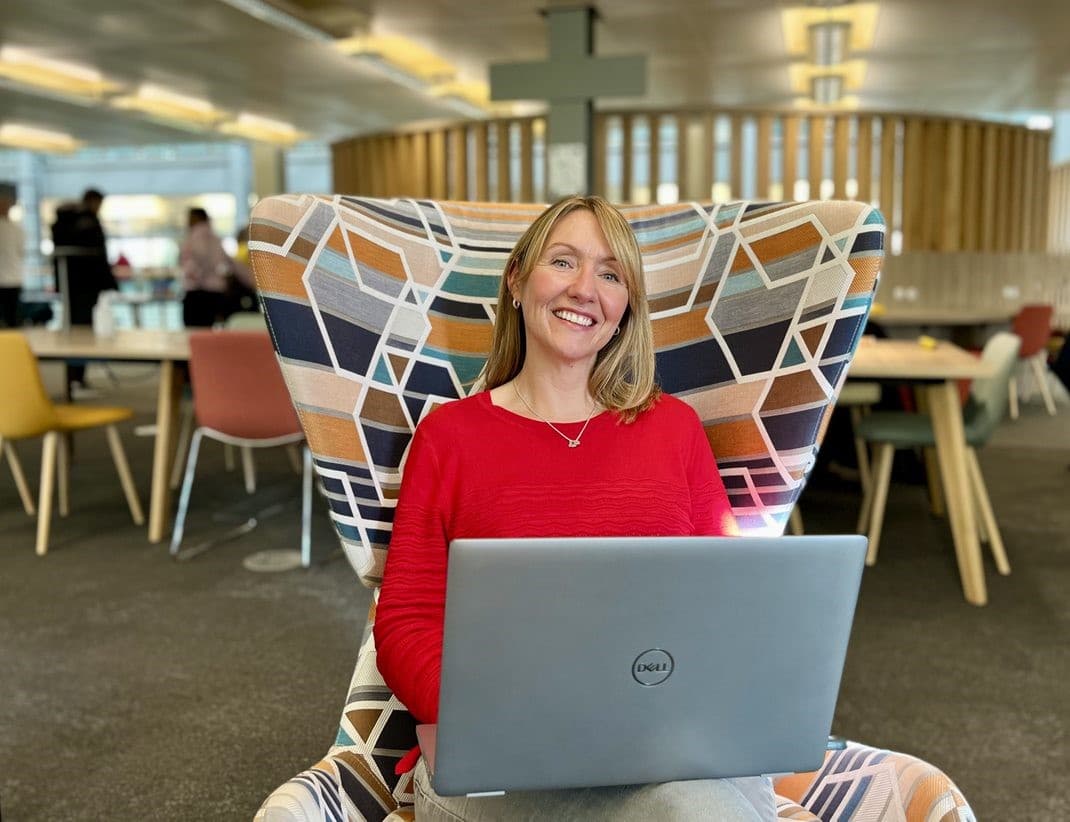We interviewed Joanne Punton, a Business Analyst at DWP Digital and part of their award-winning Digital Voice’s programme on her thoughts and experience on Women in Tech.

-
What does your job involve?
My role as a Business Analyst at DWP Digital is really interesting. It involves understanding what the business needs are and how digital can assist in providing a solution. Initially there’s a lot of work to gather information to get a really good understanding of the current situation. Then, it’s about working with people to find a solution and see that through to delivery.
I really enjoy my work. I like the way the teams are set up and I like that we work collaboratively with different teams and professions all with varying skills and viewpoints. I work with technical teams, lots of operational colleagues, policy, legal, so many different people. We have all got our own thing that we bring to the project and together we produce something that delivers value – which is the point.
A common misconception can be that the technical people know best; they are the experts, and in terms of technical things, that is true. However, in the technical world, we are delivering services to people. Whatever we deliver, needs to be usable so that’s where you need the non techies, like me as a Business Analyst.
-
What made you choose a career in technology?
I fell into a career in technology just like so many people do and while I’m not a particularly technical person, I’m interested in what technology can do and what value it can deliver. It’s an ever changing and innovative environment to work in.
I think the motivation and the driver for me is knowing that when we create and deliver something, that it’s absolutely 100% going to improve people’s lives. My work in DWP Digital has a real impact on real people, which is rewarding.
-
Did you study an IT or technology related subject at A-Level or University?
I did a business BTEC when I left school and then much later did a Business Analysis apprenticeship. I don’t have a degree. I don’t even have A-Level’s actually. You don’t always need that. You can be clever; you can be intelligent and good at your job without having a degree to prove that.
-
Did you get any work experience in IT or technology before this role?
I started my career in a youth training scheme doing admin aged 16. The company I worked for started taking over other companies and rolling out their systems. My manager at the time recommended me for the team, the role started with knowing how the processes worked, training people on the new system and stakeholder management.
From there I moved to a role on an IT service desk and then stayed within the service management side of IT for some years which involved supporting users, managing problems, change management and performance reporting.
-
Do you think there is a lack of females in the IT and tech sector?
Definitely, I remember in one of my early roles nearly 30 years ago there was about 50 people in the IT department and only 2 or 3 were women.
As the years have progressed, I’ve seen more women come into IT. Certainly in the teams that I’m in now, there is a much higher balance of women to men.
However, there are particular roles that seem to attract more women, such as the business analysts, product owners, delivery managers, and the user researchers. It’s where you use other, not deeply technical skills, sometimes softer skills, I don’t like that term because it sounds like they’re not real skills, but they’re just different skills and equally as valuable, It’s clear to see that that those roles are absolutely necessary to deliver a service.
I would love to see more women in the technical roles, there is still a lot of work to do.
-
Do you find there is a stereotype that a career in IT or technology is just for men?
People think it’s a male dominated industry, that IT is very technical, and you’ve got to be majorly intelligent maths and science degrees. Actually, that’s not the case, it couldn’t be further from the truth.
Even in the technical roles there’s so many different things you can do, it’s not just about coding – but it has that reputation.
-
What would entice more women to study technology related courses?
I would love to see younger girls making those choices in school, it would be wonderful. As a parent of school aged children, I think the IT courses offered by schools don’t always accurately represent IT in the workplace and work needs to be done to update the course content.
Maybe the tech industry could work more closely with schools to target younger girls to show them what a career in IT could look like and the type of roles that are available, so they have the information when making education choices.
Not everyone in IT is writing code or is a high academic achiever. We need to share the many skills that are useful in IT and that technology has so many wide-ranging professions and roles.
-
Are there barriers when it comes to women getting into tech?
I would love to understand why women aren’t interested. Is it because at school, it’s very much focused on the technical side of things, and they don’t see anything else?
I think once women are in a non-technical role or team, they don’t see that they can make the jump over to digital. It surprises me because I work with operations all the time and there are some amazing clever, organised, skilled people. They are great at what they do, they would be great in IT because they have the skills we need. We need to get people to understand digital is not necessarily all about the technical skills.
-
How could we encourage more women to start a career in tech?
Talk more about our roles and experiences, promote what we do and who we are. I’ve joined the award-winning Digital Voice’s programme, to help my find my voice so that I can support other women coming into tech, to help them understand that it can be a rewarding career choice.
There is so much support in DWP Digital, we’ve got the Digital Voice’s programme and the Women in Digital network. There are different programmes available for women to join and link in with others. I think that’s quite a unique thing that DWP Digital offers and I feel lucky to be part of it and to have that support from amazing women.
-
What advice would you give young women today at the start of their career?
Believe in and trust yourself. Don’t be afraid to take a chance, and when opportunities come up, say yes. Don’t be afraid to ask for help and support, most people are more than happy to support others if you ask. When people say you can’t, keep on going, don’t let one person’s opinion hold you back.
Find out more about a career at DWP Digital.






